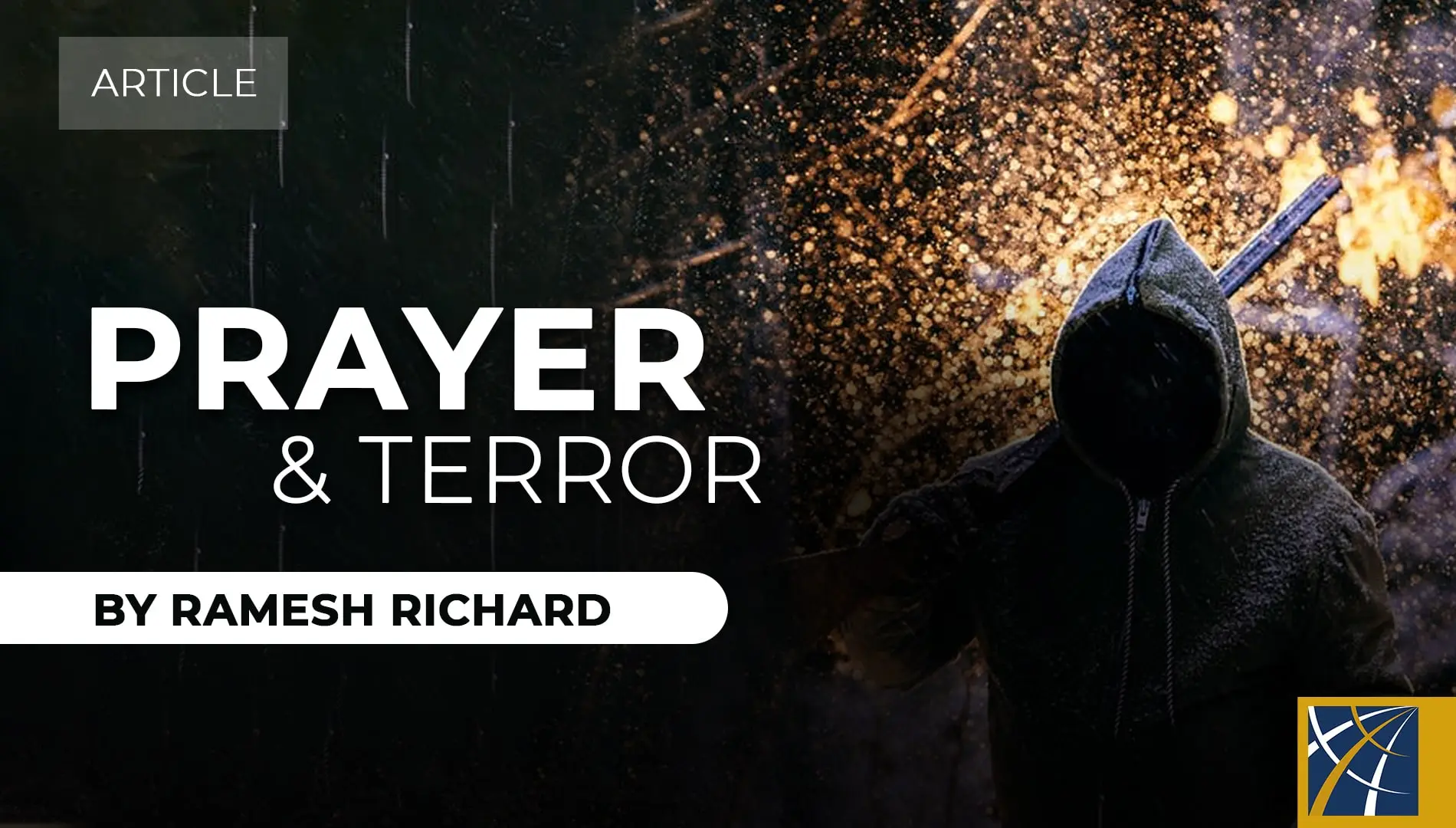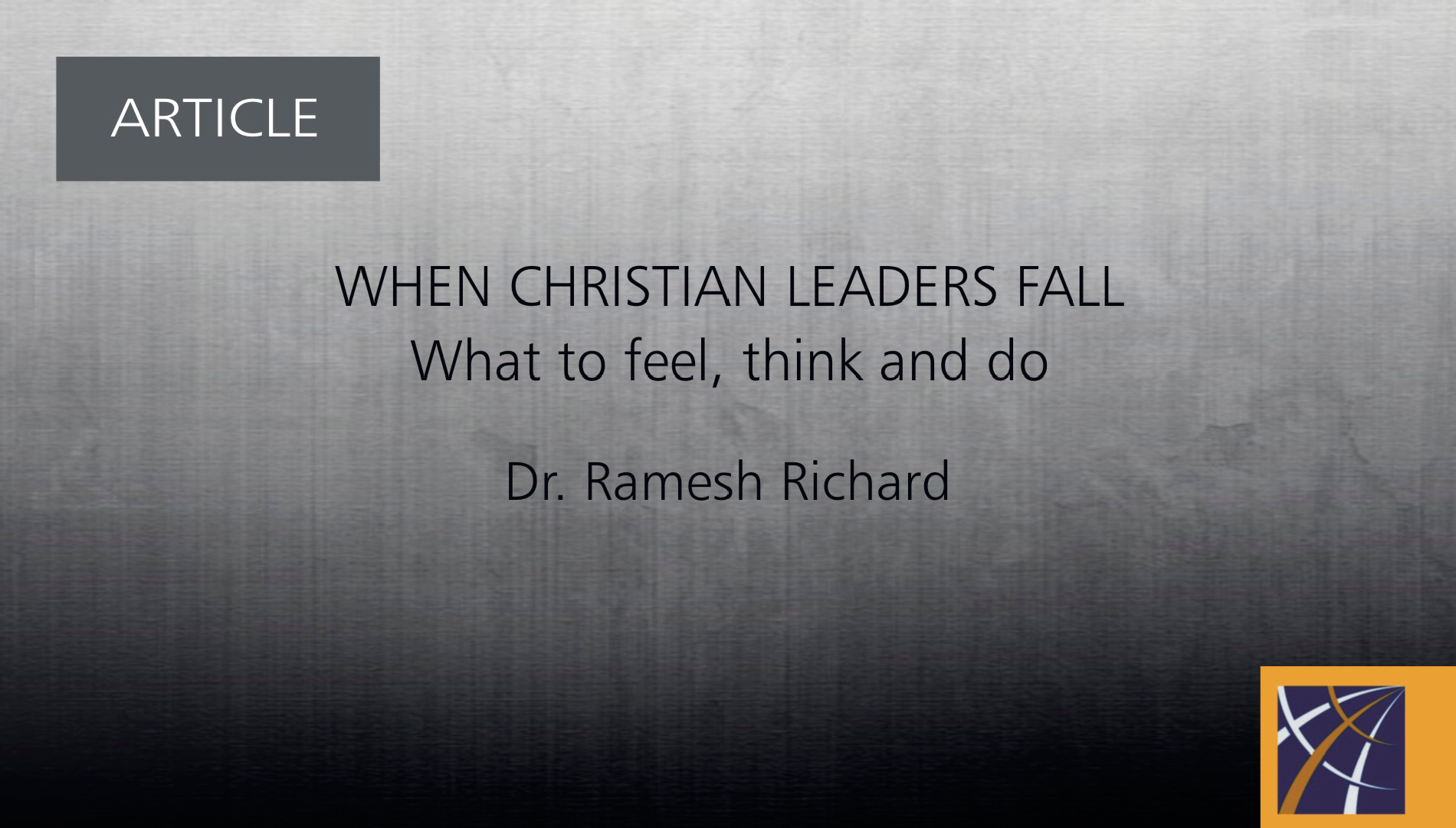by Ramesh Richard
April 2015
What Should We Do?
In 2015 when the 21 young men were beheaded on a Libyan beach by the savagery of ISIS, I was overcome, like you, with deep sorrow. Their ages and complexion resembled my own two sons. It felt like our Ryan and Robby were kneeling at the feet of their captors for nothing else than their traditional community connections with the Coptic Church. Indeed, these 21 victims had families much like Bonnie and myself. Understandably, their loved ones wailed inconsolably over the premature demise of sons, brothers and fathers murdered by professionally videographed barbarism.
Today is Sri Lanka’s day of mourning over the terrorist bomb blasts in churches and hotels on Easter morning two days ago. Sadly, hundreds were killed including two extension students of Colombo Theological Seminary, a sister institution which I highly esteem.
The modern world, while incredulously viewing violent jihadi activity through the lens of Christian Crusader comparisons from the Middle Ages, could not stand the bloodthirstiness demanded by the religious behavior of their victors. World leaders continue to consider what might be effective response to restrain murderous bestiality. Affected nations of the victims, take quick, short, decisive action. Vested countries in the region react in their own ways. Others discuss and debates present and future implications of any counteractions. In all of this, how should we think about this cold, cruel and callous depravity of certain members of the human race? What should the individual Christian believer do?
Some time ago, I was in the Imprecatory Psalms for my devotional feedings (an awful Psalm 109, and then Ps. 138, 140, etc.). An imprecatory psalm calls for severe judgment on God’s enemies. It’s when the psalmist freely invokes divine vengeance, ghastly and dreadful (cf. Ps. 69:22ff). And I was torn on the inside. Having viewed pictures of Iraqi kids who were the age of my grandkids crucified by ISIS, I naturally developed a very human rage along with sorrow. Should I pray these imprecations on the terrorists? Not that I had executive power to carry out my feelings, but decisive, vengeful destruction of these enemies seemed instinctive and just felt right.
Except I had to pause in reflection as I went further in the Bible to the New Testament.
The One I believe (and the 21 Egyptians followed) predicted the hatred of the world toward His followers (John 15:18–26). Believers and followers were to expect hatred as the normal response to bearing witness to their Lord. Although He was finally crucified, he preached something other than vengeance: “Love your enemies and pray for those who persecute you” (Matt. 5:44); “Bless those who curse you, pray for those who abuse you” (Luke 6:28, ESV). Hence, there is a prescribed response to persecution, physical or otherwise, by our Lord and Leader. Finally, He practiced what He preached in his death cry: “Father, forgive them, for they don’t know what they are doing” (Luke 23:34, NET). A disciple is not greater than his teacher, neither the servant than his Lord.
So here we have Jesus’ forgiveness of persecutors—an unnatural, even supernatural response, and a potential contradiction of the psalmist’s curses against them—our natural instincts. What am I to do in this Old Testament and New Testament quandary theologically and existentially, since Jesus seems to effectively cancel and then replace the spirit and content of the psalmist’s imprecation? Theologically, I know that the days of each martyrs’ life were ordained. Existentially, I know that my contemporary sensitivities to violence and victimization have been largely shaped by Christianity, or I might sympathize with human butchers. This issue must be studied theologically and applied existentially where the connection creates the challenge.
Perhaps there is no other place where the Bible’s feature of “incremental revelation” (theologians call it “progressive revelation,” but the Bible doesn’t morally progress) becomes more necessary for its interpretation before applying both the psalmist’s imprecatory prayers of malediction and Jesus’ invocation of benediction on enemies.
Making Sense of Scriptural Teaching
Here’s how I make sense of both our Lord’s prescriptions and the psalmist’s expressions.
1. The Lord Jesus trumps the psalmist for which model a Christian should follow today (cf. 1 Pet. 2:19ff). Jewish behavior might follow the Old Testament, but Christians have no option in this personal matter of following Jesus. In fact, the only distinction between our view of the Christian terrorists of the Middle Ages and Muslim terrorists now is the simple and clear question of approval. Would the founder of the Christian faith, Jesus Christ of Nazareth (crucified young), have approved of Christian Crusader activity in His name? The answer is an unequivocal “no” by all Christians—all Christians now, that is. The Crusaders erroneously conquered in Jesus’ name, reflecting neither His loving spirit nor His teachings toward enemies. Christians today can condemn Crusader atrocities as evil without fear of reprisal by other Christians. And yet, all current terrorists see an integral connection between the teachings of their “God-sent” prophet (who died at 62 of illness) and their religiously approved violence today. They would answer an unequivocal “yes” to the founder’s approval of their barbarity. Muslims dare not call their terrorist brothers wrong because they will dearly pay for their opinion. An Arab Israeli friend remarked, “We see their ideology (their founder and system) as evil, and its follower as victims.” I hastened to add, “Christian ideology (our founder and His system) is good though its followers can be evil.”
Love, Pray For and Bless Enemies
2. The founder of our faith, Jesus the Christ, commanded us to love, pray for and bless enemies as our personal response to persecution and martyrdom.
- Love your enemies because they are human beings in the image of God (albeit depraved, deprived and demonized). They, too, were once normal kids bringing pleasure to their parents on playgrounds near war zones where they became indoctrinated and radicalized.
- Pray for (not against) enemies, that they come to know God’s eternal salvation and receive forgiveness from the Savior, whose upcoming universal judgment will prevent their eternal salvation. They will be eventually caught in their own traps, unstoppably pulverized and hurled into eternal hell, since that is what they (and we) deserve (cf. 2 Thess. 1:7–9; Rev. 6:10).
- Bless your enemies, since there is a chance that they could be redeemed by our Jesus-like responses to their wickedness. The Old and New Testaments ask us to do good to our enemies—caring for a needy enemy (Prov. 25:21–22; Rom. 12:20). The New Testament commands us to “never pay back evil for evil” (Rom. 12:17, NASB, emphasis added). So vengeance is out.
Pray for (not against) enemies, that they come to know God’s eternal salvation and receive forgiveness from the Savior, whose upcoming universal judgement will prevent their eternal salvation.
3. Imprecations—cursing or condemning persecutors—may be permissible in the Old Testament yet are without prescription in the New Testament. We should avoid turning the psalmist’s practice into spiritual prescriptions just as we necessarily avoid bending the wisdom of the Proverbs into unconditional promises. But since we certainly claim the psalmist’s other expressions for our spiritual life (e.g., Ps. 23), is there any application of imprecatory psalms to the people of God today? It is critical to overlay a New Testament lens on everything (after all we are Christians) in order to set certain conditions for any imprecatory prayer. Even when made on behalf of others persecuted for righteousness’ sake (Matt. 5:10), we need to remember some important limitations.
We hate evil and sin, as God does, even in ourselves.
- That we hate evil and sin, as God does, even in ourselves. For example, do we detest the moral warfare, the spiritual terrorism occurring via highly sexualized, West-produced entertainment? Do we abhor all that is evil and cling to all that is good (Rom. 12:9)? We must reject complacency concerning some aspects of evil, use every legal means to express our abhorrence of evil and possibly restrain it. There is good and evil, right and wrong, truth and falsehood. We curse all evil and despise all evil behavior anywhere—including inside ourselves.
- That in this prayer we avoid copying the religious sins of our enemies. The only One who could have legitimately prayed an imprecation did not, even as He was being crucified. Imprecation may be justifiable by a truly innocent victim, but only by one who is entirely blameless (cf. Ps. 143:2, 12). While prayer against enemies is an understandable reaction only for a righteous person, we ought to be very careful! There is none righteous except One. No biblical martyr desires to curse his murderer and fall into the murderer’s own sin. If we respond rightly when persecuted for righteousness’ sake, we are blessed with the kingdom of heaven and are promised the reward of heaven (Matt. 5:10–12). And it is possible and appropriate to be angry, but not sin (Eph. 4:26). So prayerful, anger-filled desperation toward God about those who destroy human life is acceptable. These prayers are not sinful and are often psychologically healthy. Yet, these serious imprecatory prayers must neither be deployed stupidly in personal relationships that break down due to our own selfishness and sin, nor employed against those inside the Christian circle, nor—because of Jesus—even in this selfish manner against those outside the Christian family. Though we may be opposed by Christian or non-Christian enemies, imprecatory verbal expressions, appealing to God’s justice now or in the future, are only proper against those abusing the people of God for their faith convictions—not for random breaks of human relationships.
- That we wait, knowing that God is not blind or unjust. We leave it to God to punish evil, in His own way, in His time and for His reputation. Now because of an existential pause on this theological subject, we might think imprecation is the dominant notion in the Psalms. Fifteen of the 150 psalms carry imprecation in them, and it is God’s name, God’s vengeance, and God’s action of direct and swift justice being requested by His people in misery. Further, imprecatory prayers are just that—verbally expressive prayers. “I am [in] prayer,” says the psalmist (Ps. 109:4, NASB), even as he requests God to do some shocking things to his enemies—consume them, blind them, break their babies. He could have killed his enemy but instead took the prayerful way out, appealing in raw fashion to God’s cosmic justice. Elsewhere, a prophet in anger wishes God’s necessary vengeance (Jer. 11:20). The psalmist and the prophet, however, would not take matters in their own hands, but left them in God’s hands. Actually in the Old Testament (not just in the NT) God claims the right to vengeance (Ps. 94:1; Deut. 32:35, cf. Rom. 12:19; Heb. 10:30). So our supplications for natural, wishful vengeance must be requests for divine vengeance, not actions out of personal vendetta. They are predictive (near and far fulfillment) and not for immediate action. We pray for the full defeat of enemies (which takes judgment) and the soon destruction of their plans (whatever it takes). We pray without hatred of individuals, but do pray for God’s judgment against their plans, and on those who propagate them, whether leaders or groups of terrorists. We pray for the salvation of enemy-individuals and the destruction of enemy-ideologies. While Christ’s martyrs experience human wrath, the murderers of Christians will experience divine wrath for their sins, sooner or later. We pray for the worst thing that could happen (in their view)—trusting their Isa as Yesua, Savior God—all the while knowing it is the best thing that could happen to them (in God’s view).
We wait, knowing that God is not blind or unjust.
- That the psalmist, when he asks for the ability to cut off his enemies, is speaking as the royal representative of his covenant nation and Davidic dynasty, and Christian believers or churches are not. This is a crucial point at which we separate the imprecatory behavior of the psalmist as an individual in gloom from the psalmist as king, who needs to keep his family line alive. Consequently, we separate the behavior of Christians and the church toward their enemies (love, pray, bless) from that of one’s nation and their militaries (pre-emptive or just war) against all enemies of any state. We do not confuse church with state, the New Testament with the Old Testament, the believing individual with the unbelieving community. We do not equate any other nation with Israel (OT, present, or future Israel). We are for justice, but without vengeance and against revenge. Military action before enemies strike us is an act of life, rather than revenge taken after an attack. We support the state in matters of justice and defense, but will not get so close to power that it blinds us in baptizing all state actions as Christianly. When the state trespasses from being a just defender of its citizens, the church functions as its conscience in a prophetic tone, note and role. Our enemies for whom we pray, unfortunately for us, do fuse their “church and state” (a 5 fusion to which Christians are tempted) into a theocratic state and fall into the violent stupor of a death cult with a genocidal vision.
- That we are willing to freely suffer for the Gospel. While we accept that our enemy might cut our head off as we bring them the Gospel, we are unwilling to give declared killers the freedom to carry out their terrorism. We support a military response in selfdefense of all citizens (Christians and non-Christians) as a moral, governmental obligation. Nations should not wage war in the name of peace, but can go on the offense for the sake of self-defense. Although terrorists are made in the image of God, they have declared and implemented prior decisions to take human life (also made in the image of God). Self-defensive, pre-emptive action by nations is mandatory to prevent further murderous bloodshed. I support such action through a theological framework of justice, peace and life: While I am free to get my head cut off while following my Lord, I am not free to tell nations to follow my Lord’s pattern of restraint since national self-defense for everyone’s protection is a moral obligation. Offense in the cause of self-defense, and only for the sake of self-defense, is quite just. History is filled with examples, however, of those who treaded this tension and paid with their lives before the Gospel could take root and flourish for the common good of all. Christian missionaries often served the very people who were being economically raped by their colonizing nation. I also know Christian workers today who serve in the most challenging contexts with a conviction about dying to get the Gospel out. Such Christians are not seeking death (suicide or self-murder) but are willing to suffer death for the cause of facilitating earthly and eternal life. So until a legitimate war cuts off the head of the anti-Christian enemy, some Christians are committed to getting the Gospel to all in dangerous regions, before their heads are cut off. I presume if and when I face a deadly situation for bearing witness to my Savior, I would call on the One who enabled me with His strength through life (Phil. 4:13) to carry me through death and bring me safely to His eternal kingdom (2 Tim. 4:18).
We are willing to freely suffer for the gospel.
- That we don’t overlook caring for the defenseless and persecuted even as we deeply appreciate the precious public freedoms we experience. We are pro-life wherever human life is—in the womb and outside, in our own nation and other nations. We will do good to all people, with special priority to the household of faith (Gal. 6:10). We believe and act in solidarity with the human family and in priority to the Christian family. We pray for supernatural protection for all facing persecution for their faith, for supernatural strength in their hour of extreme desolation, for supernatural deliverance in accordance with God’s will, and supernatural comfort for their families. An eminent Jordanian Christian leader told me that the word beheaded is actually used in the English Bible though not in the Arabic, and showed me how it is anticipated in Revelation 20:4. That dastardly act is overturned by the glorious expectation of our martyred brothers and sisters (along with their martyred school-age children), who had been “beheaded because of their testimony of Jesus and because of the word of God … [will come] to life and [reign] with Christ for a thousand years.” Until then, we willfully follow the Lord’s prescription publicly, even though we are naturally prone to the psalmist’s imprecation against enemies privately. The former might be the witness needed for one terrorist to become an evangelist.
A Former Terrorist
That’s exactly what happened to terrorist Saul, who was in “hearty agreement” with the murderers while watching the execution of the first martyr (Acts 8:1). He “began ravaging the church, entering house after house, and dragging off men and women, he would put them in prison” while “still breathing threats and murder against the disciples of the Lord” (Acts 8:3; 9:1). Yet Stephen, after plainly speaking the truth (Acts 7) neither ranted nor raved against his persecutors while facing imminent death; it was the first-century terrorists who were enraged (v. 54). Instead, Stephen mimicked his Lord in not calling down immediate punishment. He requested forgiveness for them (Acts 7:60) as he saw the Lord Jesus in heaven (v. 55) and cried out, “Lord Jesus, receive my spirit” (v. 59). (The martyrs we know about expressed this same intense gentleness while facing death and anticipated seeing their Savior as far better than this life.) Eventually terrorist Saul would become evangelist Paul. (By the way, he too died by decapitation—beheading—an old, efficient way to silence political and religious dissidents.)
I have no guarantee that any violent jihadi would embrace Isa/Yesua as the Only God who saves him. Might there be one Saul in the making right now among the 21 murderers, even as he heard some martyrs whisper, “Lord, Jesus Christ”? One young victim, with eyes closed, discernibly sighed, “Ya, Rab Yesua,” (Oh, Lord Jesus). When Bonnie heard of these last words, she immediately thought that the Lord Jesus appeared to them. We know they didn’t practice a coordinated choreography for global witness, so she might have some support from Stephen’s final earthly, vision of Jesus. Did they too, like Stephen, see the Lord Jesus in their last moments on earth transiting to their first moments in heaven?
Let me close this difficult article compelled only partially by my own theological and existential struggle. It also arose through counsel from Middle Eastern Christians who externally suspend their fears and with great difficultly internally sublimate their hate in order to lovingly serve the “the worst refugee crisis in modern history” (UN). They sacrificially minister to their pre-Christ neighbors in Jesus’ name, spirit and teaching without knowing who might betray or murder them.
“I do not wish them evil. I pray for them, that God may open their hearts and give them light.”
If we pray at all for the persecuted and against the persecutors, we shall engage in sincere invocation for their salvation even as we extend Christian forgiveness. The mother of Tawadros Yousif, simply a village lady yet also mother of one of the Egyptian dead, reflected that uniquely Christ-like conclusion, saying, “I do not wish them evil. I pray for them, that God may open their hearts and give them light.” While our natural tendency beckons divine judgment, we should pray for the salvation of individuals first, and as soon as possible, by the Divine Savior before wishing for their immediate or final judgment by the Divine Warrior. We dare not forget that, like Saul, terrorists too can take refuge in Jesus, God’s Son and Savior. Will God, in wrath, remember mercy for God’s people (Hab. 3:2) and for the persecutor too?
Ramesh Richard, Ph.D., Th.D.
Professor of Global Theological Engagement and Pastoral Ministries at Dallas Theological Seminary and Founder and President of Ramesh Richard Evangelism and Church Health (RREACH). See more about Dr. Richard’s global proclamation ministry at www.rreach.org.






